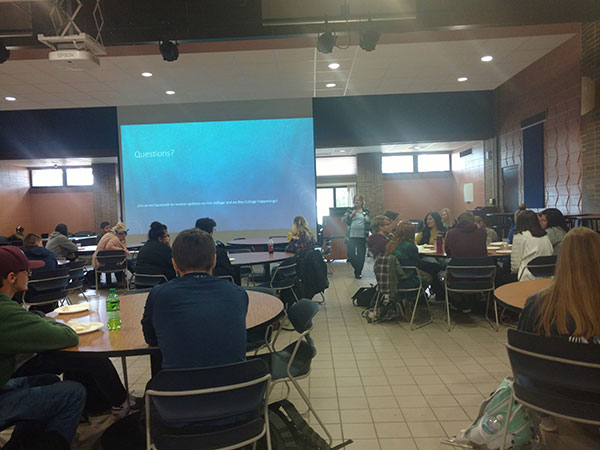Students Learn Importance of Upcoming Millage During Town Hall
News

From its beginning more than fifty years ago, Bay College has been a major economic driver in Delta County contributing over $100 million annually to the local community. In an unwavering commitment to the success of every past, present, and prospective student, Bay College has assisted 12,483 graduates and 16,120 degree-holders over the past half century achieve their educational goals. With approximately 2,000 students per year attending Bay College, a recent Student Town Hall meeting was held to provide critical information about Bay College’s future, seek students’ feedback on their experiences, and discuss how leadership could address their needs.
Garnering student perspectives in a variety of ways, the Bay College Student Town Hall was one method leadership could hear directly the collective voice of the student body. Bay College President, Dr. Laura Coleman met with students on Monday, October 14 in Café Bay where a gathering of more than sixty students listened closely and learned more about the importance of sharing their voice.
Students learned more about how the college operates to create a conducive learning environment in and beyond the classroom and how the college will operate more efficiently from the 0.8924 millage request the community will be asked to vote on November 5, 2019. Dr. Coleman explained that the reason the millage request is necessary is because the college consistently operates in an environment of underfunding from the State of Michigan, a loss of $1.3 million per year, coupled with the need to replace critical infrastructure systems beyond their useful life. Dr. Coleman explained to students that the systems currently heating, cooling, lighting and securing campus are original to the college and therefore more than fifty years old, inefficient and unsustainable.
“We have critical improvement needs in building infrastructure, lighting efficiency and safety systems,” said Dr. Coleman. She went on to explain that the installation of new critical infrastructure systems is part of a comprehensive plan to reduce costs of operations through renewable energy, reducing the facility’s carbon footprint by installing boilers that are over 95% efficient, improve safety through new exterior lighting, and ensure a centralized security system that will lock down the campus with one button in the event of an emergency.
While many students may not be homeowners but plan to be, they learned that the millage will cost a Delta County homeowner of an $80,000 house only $2.97 per month and would be a boom to the local economy by hiring local contractors.
“It will be a savings for engineering and construction costs by addressing all of the systems at one time- from heating and cooling to safety and security. The contractors involved will be predominantly local ensuring investment will remain in Delta County,” Dr. Coleman explained.
During the question and answer period, one student asked about student housing and if the millage would be used toward new dormitories. Dr. Coleman explained that student housing is going to be renovated.
Students benefit today from yesterday’s investments in education, and programs like mechatronics and robotics, welding, cybersecurity, agricultural operations, EMT and paramedics, and MRI technician programs are all programs owed to the generosity and shared commitment the community demonstrates toward our students.
“When I graduated high school, I didn’t really know what I wanted to do. But here at Bay I can have small class sizes and start my journey to become an architect,” says Dylan Anderson, a freshman at Bay College studying General Science.
Bay College is committed to community and student success, providing the opportunity for every resident of Delta County to earn a high -quality college education affordably leading to career readiness in high demand fields. “The community has demonstrated its support of Bay College in the past. Together we can make the future stronger,” concluded Dr. Coleman.
Latest News
- Samantha Griebel to Address Bay College Graduates During Commencement
- Bay College Greenhouse Announces Its 2024 Plant Sale
- Winter 2024 Student Art Exhibition - "Celebration of Student Success" to Take Place at Bay College
- Upper Michigan Safety Conference Hosted by Bay College
- BAY-CON Returns on April 20!